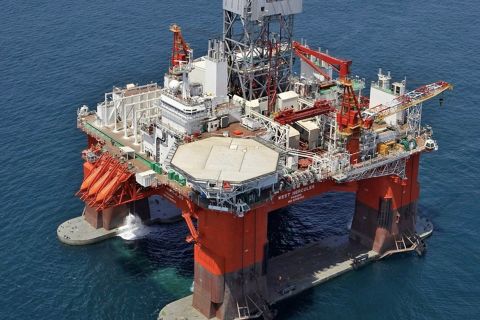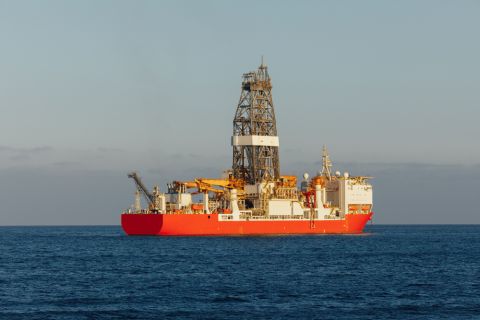
Dominion Energy plans to add 5,000 MW of offshore wind turbines in 15 years. (Source: Shutterstock.com)
Natural gas will fuel power generation for years to come at Dominion Energy Inc., one of the largest U.S. utilities, even as it sells a huge pipeline network to Warren Buffett and adjusts to an aggressive clean power mandate in its biggest market.
Dominion, based in Virginia, has set out a goal of “net zero” emissions of CO₂ and methane from power plants and gas infrastructure from 2050. Democrats in its home state this spring enacted a law requiring the company’s local electric utility to use 100% carbon-free energy by 2045.

Yet natural gas, the fossil fuel with the lowest carbon emissions, would continue to be crucial to the company’s power mix, said Thomas Farrell, chairman and CEO.
“In my opinion, for some considerable period of time, I don’t know if it’s 10 years, or 15 years, or 20, you’re going to need fast-start gas-fired power plants that can help cover the needs of the economy when renewable power’s not working,” Farrell told the Financial Times in an interview.
Solar and wind power depend on sunny days or strong breezes to operate. Maintaining reliable electric service requires resources available at any time, such as gas or nuclear generators. Battery storage is emerging as another option to back up renewables, but remains in its infancy on the grid.
Partly in response to the Virginia law, the company this spring dramatically revised a long-term state resource plan that envisages adding more than 15,000 megawatts (MW) of solar capacity and 5,000 MW of offshore wind turbines in 15 years. More than 2,700MW of storage resources also feature in the plan. Farrell said he was “rooting” for researchers working on batteries.
Dominion’s resource plan also said the company would probably need to preserve thousands of megawatts of gas-fired generating capacity. It projects that gas would account for about 25% of power production in 2035, down from 42% in 2019.
Farrell spoke as he announced a new role for himself as Dominion’s executive chairman, with Bob Blue, head of the Virginia power utility and Dominion’s contracted generation businesses, becoming CEO. Farrell has served as CEO since 2006.
This month, Dominion agreed the $9.7 billion sale of its natural gas transmission and storage business to Buffett’s Berkshire Hathaway. The same day, it canceled the pursuit of its proposed Atlantic Coast pipeline, even though the U.S. Supreme Court had days earlier ruled the project could receive a crucial federal permit.
RELATED:
Dominion Takes $2.8 Billion Charge to Exit Atlantic Coast Natgas Pipe
Dominion and its project partner Duke Energy said other litigation presented new uncertainties for the Atlantic Coast project, the cost of which had ballooned to $8 billion from about $5 billion when first proposed in 2014.
A number of factors led to the sale of the gas transmission and storage business to Berkshire Hathaway, including changes to federal policy related to the financing of pipeline businesses, Farrell said.
“But it’s also a recognition by us that we are a leader in clean energy among utilities, and we are going to be the leader,” Farrell said.
Recommended Reading
US Drillers Add Oil, Gas Rigs for Second Week in a Row
2024-01-26 - The oil and gas rig count, an early indicator of future output, rose by one to 621 in the week to Jan. 26.
Second Light Oil Discovery in Mopane-1X Well
2024-01-26 - Galp Energia's Avo-2 target in the Mopane-1X well offshore Namibia delivers second significant column of light oil.
E&P Highlights: Jan. 29, 2024
2024-01-29 - Here’s a roundup of the latest E&P headlines, including activity at the Ichthys Field offshore Australia and new contract awards.
Seadrill Awarded $97.5 Million in Drillship Contracts
2024-01-30 - Seadrill will also resume management services for its West Auriga drillship earlier than anticipated.
Oceaneering Won $200MM in Manufactured Products Contracts in Q4 2023
2024-02-05 - The revenues from Oceaneering International’s manufactured products contracts range in value from less than $10 million to greater than $100 million.




